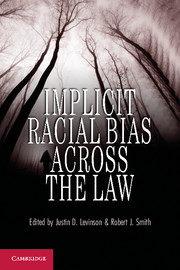Book contents
- Frontmatter
- Contents
- Contributors
- Acknowledgments
- Implicit Racial Bias Across the Law
- Introduction Racial Disparities, Social Science, and the Legal System
- 1 Implicit Racial Bias
- 2 Property Law
- 3 Criminal Law
- 4 Torts
- 5 Employment Law
- 6 Health Law
- 7 Education Law
- 8 Communications Law
- 9 Corporations Law
- 10 Tax Law
- 11 Intellectual Property
- 12 Environmental Law
- 13 Federal Indian Law
- 14 Capital Punishment
- 15 Reparations Law
- Index
- References
14 - Capital Punishment
Choosing Life or Death (Implicitly)
Published online by Cambridge University Press: 05 June 2012
- Frontmatter
- Contents
- Contributors
- Acknowledgments
- Implicit Racial Bias Across the Law
- Introduction Racial Disparities, Social Science, and the Legal System
- 1 Implicit Racial Bias
- 2 Property Law
- 3 Criminal Law
- 4 Torts
- 5 Employment Law
- 6 Health Law
- 7 Education Law
- 8 Communications Law
- 9 Corporations Law
- 10 Tax Law
- 11 Intellectual Property
- 12 Environmental Law
- 13 Federal Indian Law
- 14 Capital Punishment
- 15 Reparations Law
- Index
- References
Summary
“Even under the most sophisticated of death penalty statutes, race continues to play a major role in determining who shall live and who shall die.”
– Justice Harry BlackmunA Fulton County, Georgia, jury sentenced Warren McCleskey, a black man, to death for the murder of a white police officer. McCleskey argued on appeal that his sentence should be reversed because race discrimination plagued the administration of the death penalty in Georgia. To make the claim, McCleskey presented a comprehensive statistical study that tracked more than 2,000 Georgia murder cases. The raw numbers established that defendants charged with killing white persons received the death penalty in 11% of cases, whereas defendants charged with killing black persons received the death penalty 1% of the time. The raw numbers also established that black defendants charged with killing white victims (as opposed to those who killed black victims) were twenty-two times more likely to be sentenced to death. Once adjusted to account for more than two-hundred case-related factors, the Baldus study demonstrated that a defendant charged with killing a white victim was 4.3 times more likely to receive a death sentence than a defendant charged with killing a black victim.
In 1987 in McCleskey v. Kemp, the U.S. Supreme Court rejected the challenge to Georgia's death penalty system despite the overwhelming statistical evidence suggesting that race (and especially race of the victim) played a significant role in whether a defendant received the death penalty. The Court accepted the race disparities for the sake of argument, but observed that the studies that McCleskey presented could not prove that race bias affected his particular case. In dissent, Justice Brennan labeled the Court's position that such claims “would open the door to widespread challenges to all aspects of criminal sentencing” as “a fear of too much justice.”
- Type
- Chapter
- Information
- Implicit Racial Bias across the Law , pp. 229 - 243Publisher: Cambridge University PressPrint publication year: 2012
References
- 4
- Cited by



